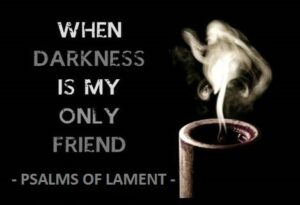 The OT has something of core spiritual value that the NT doesn’t—the repeated observation and lamentation over God’s absence, the sense of God’s abandonment.
The OT has something of core spiritual value that the NT doesn’t—the repeated observation and lamentation over God’s absence, the sense of God’s abandonment.
The OT, as we all know, has a dark side—what Walter Brueggemann calls Israel’s “counter testimony.”
In Israel’s “main testimony,” the story from Genesis through 2 Kings (from creation to exile), Israel’s plan for what it means to be the people God is laid out (albeit with all sorts of interesting and unexpected bumps and grooves): obedience to God leads to life in the land while disobedience leads to divine punishment and eventually exile.
The blessings for obedience and curses for disobedience are laid out clearly, if not graphically, in Deuteronomy 27-30, and the same general idea in poetic form can be seen in Psalm 1.
But a key dimension of Israel’s tradition is the observation that the “rules of the game” that God insists on can’t be counted on.
Psalm 73, for example, notices that—contrary to God’s promise—the wicked prosper uncomfortably often while the righteous endure long days of suffering. Psalm 88 is a cry for help to God, but God is a no-show—darkness is the psalmist’s only companion (see the last verse). Right next door is Psalm 89, which in effect calls God a liar for failing to keep his promise that David’s line will continue forever (v. 36). The throne is empty now that Israel is in exile. God is, therefore, a promise-breaker.
And don’t get me started on Ecclesiastes and Job. Qohelet, the main character in Ecclesiastes, is seriously depressed and not a little ticked off at how God has set up the world. We go about our work day after day, it’s all the same, and we never actually have anything to show for it, because, at the end of the day, you can’t take it with you. Death cancels out all our achievements. “This is how God has set up the world, so don’t talk to me about blessing and curses, rewards and punishments.”
And nowhere in the book is there any attempt to correct Qohelet’s theology. In fact, the end of the book pronounces Qohelet as “wise” precisely because his words are painful, like spiked sticks used for driving sheep and cattle.
And poor Job. “Suffering” is too shallow a word to describe how his life utterly obliterated the neat world of “actions have consequences” that we see in Israel’s main testimony. Job’s friends try again and again to help Job see the light: “You’re suffering Job. Read your Bible. You suffer because there is some sin in your life. There must be. Actions have consequences.”
But throughout Job responds, “I don’t care what you say. I didn’t do anything to deserve this.” Even though Job’s friends merely repeated the “actions have consequences” idea that is hammered home elsewhere in the OT, at the end of the book God himself turns to Eliphaz, one of Job’s friends, and says, “My wrath is kindled against you and against your two friends; for you have not spoken of me what is right, as my servant Job has” (42:7). Even God isn’t held to the “biblical teaching” of the main testimony.
My point is that this sort of honest and even unnerving grappling with “what in the world  God is up to and why should any of us bother with this God who lays out a plan that doesn’t seem to work in the day to day world” is all over the OT.
God is up to and why should any of us bother with this God who lays out a plan that doesn’t seem to work in the day to day world” is all over the OT.
But you don’t find it in the NT.
In a word, the OT deals with exile. The NT doesn’t. The NT has a more triumphalist tone. In Christ, God has shown up definitively, finally. The NT writers tell us that in the gospel
The NT no doubt grapples with the question of suffering—no happy clappy world does the NT present—but we do not see the same anguish over the sense of God’s prolonged absence and abandonment that we see in the OT.
The exception is Jesus’s own cry of God’s abandonment in the cross, “My God, my God, why have you forsaken me,” which is a citation of Psalm 22:1, one of those “Where are you when we actually need you, God?” psalms uttered by the ancient Israelites—the crucified Jew’s abandonment by God sums up and embodies Israel’s experience throughout much of its own history.
Back to my main point: the sense of God’s absence, that anyone who has been a Christian for more than 45 minutes can attest to, finds its biblical echo in the OT, not in the NT.
The NT, after all, tells the “end” of Israel’s story—in the sense that “this is where the story of Israel winds up.” The purpose of the NT is not to raise the specter of God’s abandonment but the trumpet call of God’s triumph for Israel and all the world.
But in my experience, this is precisely the challenge for those who don’t feel triumphant.
If all we read is the NT, we are left with a sense that, however difficult things may be at the moment, stick with it: Jesus has come and he is coming back very soon.
There is no articulation on the part of NT writers of the deep sense of God’s absence that we find among the OT writers, who are there over the long haul, day in and day out, waiting for God to show up and stick to his own plan.
If all we read is the NT and we are also living though a period of God’s absence, abandonment, a period of doubt, a dark night of the soul, we may likely conclude that there is something very wrong with us for feeling this way.
If we don’t walk around in more or less a state of perpetual triumph and spiritual “victory” we will think we are some lower form of life, further down the ladder of spiritual maturity.
This is why we need to hear the experiences of the ancient Israelites to relieve us of our spiritual shame.
Their experiences are very much like ours today: life is hard, and life of faith does not automatically make it easier. It may actually make it harder at times.
 Spiritual struggles are normal for Christians. They are not to be sought after, but they are normal. They are not to be romanticized, but they are normal. They are not to be shown off and bragged over, but they are normal.
Spiritual struggles are normal for Christians. They are not to be sought after, but they are normal. They are not to be romanticized, but they are normal. They are not to be shown off and bragged over, but they are normal.
To speak otherwise is to ignore the counter testimony. The Bible tells me so—and I’m glad it does.
[I take a closer look at this issue in The Sin of Certainty, The Bible Tells Me So, and my commentary on Ecclesiastes. Comments are moderated and may take me 24 hours to get to. Trolls are not fed here, nor those who can’t seem to let it go.]
